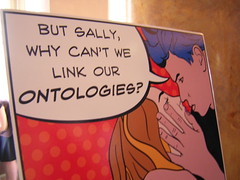Chris has been writing a bit about
tagsology. I love the idea of a paid (or unpaid, depending) ontologist taking care of business on the back end, trying to keep relationships going between concepts. I've been mulling over a couple of problems I can see with formalizing folksonomy in this way.
1. Other than things people are deeply interested in, what is the motivation to tag? I'm here at
Semantic Technology and a presenter described a tagging program she instituted at her company. Their content is perfect for tagging, the system was relatively easy to use, yet no one added any tags in six months. Her conclusion is that tagging is not something people do at work, unless it's part of their formal duties. Social search as a whole seems to be focused around passions and hobbies, rather than a large domain of things that need to be retrieved. It'll be really easy to find tags for all 10? of the Doctors from Dr. Who and nothing on the Fed chairmen before Greenspan.
2. People love to be unique. Everyone who has ever dealt with a client knows this. The first thing a client will tell you is why they are a unique flower within their industry, that they do nothing like anyone else, and by the way, have you read their mission statement? People are the same. They don't really want to tag things in such a way that they match each others' tags. Some users will tag cat pictures with the word "puppy" or "Danger!" or, in my case, "Bean" because that's her name. Important or popular documents in a folksonomy get multiple tags, but people need to find them to tag them, and with without the right entry tags, they'll never get found.

